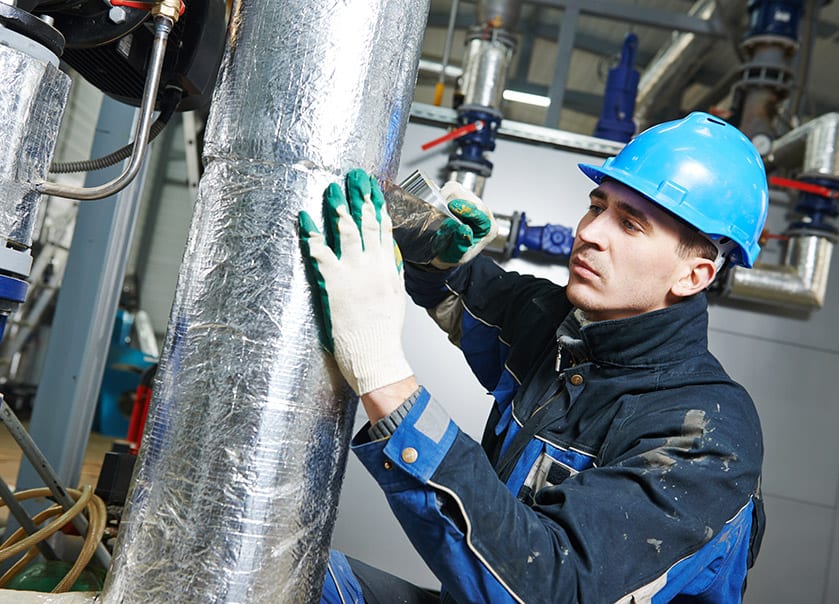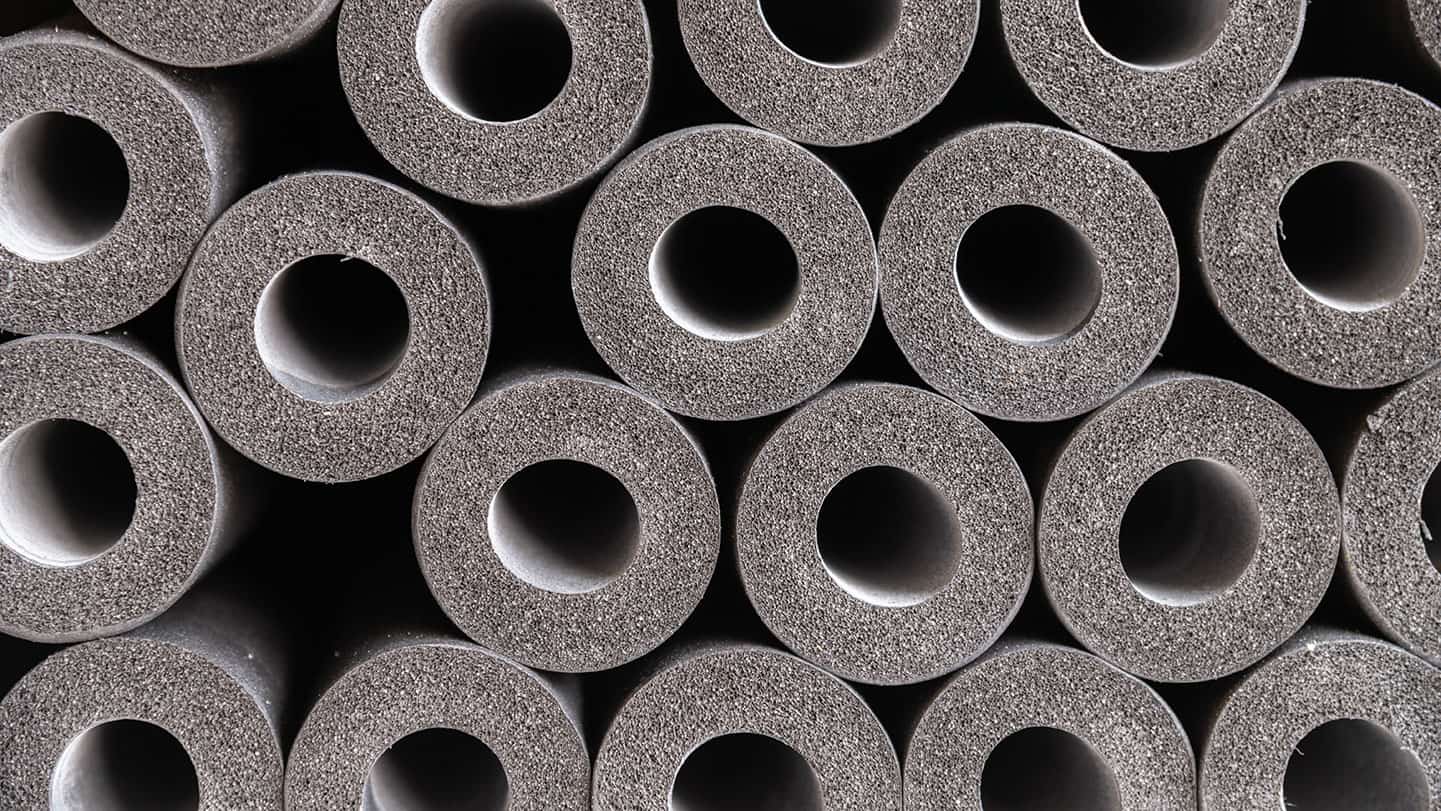The versatility and efficiency of pre-insulated pipework
Maintaining thermal efficiency in pipework is essential across manufacturing, commercial, and industrial settings. To ensure media flows at the desired temperature, pipes must be designed for optimal thermal resistance. Without this, energy can be wasted, and pipe lifespan may be reduced due to issues like condensation, foil damage, and corrosion.
Pre-insulated pipes address these challenges and offer additional benefits. They enhance thermal efficiency, promote energy conservation, and can help lower operating costs.
What Are Pre-Insulated Pipes?
Pre-insulated pipes have a layer of polyurethane foam (PUF) insulation built in. The pipe insulation can be customised to meet any project’s size, thickness, and density requirements. Installed between the inner pipe and the jacket pipe, the insulation minimises heat movement, keeping the media in the pipes at the appropriate hot or cold temperature. The PUF is bonded to the pipes during manufacturing, enabling highly specialised insulation that meets the needs of even the most demanding applications.
For example, pre-insulated systems offer exceptional thermal efficiency and pipe durability in situations where extremely hot or cold temperatures are required, such as nitrogen production plants or when transporting liquified natural gas (LNG), steam, or hot oil.

Industry standards and compliance for insulation systems
Insulation, whether pre-insulated or traditionally insulated, must comply with strict Australian standards to ensure safety and performance. Key standards include:
- AS/NZS 4859.1: Specifies the technical criteria for thermal insulation materials.
- AS/NZS 1530.3: Defines the fire testing methods for building materials and structures.
Advanced Insulation & Fabrications tests all our insulation products to meet these standards, ensuring you receive reliable, high-performance pre-insulated pipe systems.
The Process Behind Pre-Insulated Systems
The process begins with pouring Polyurethane foam (PUF) into steel moulds and curing it to create pre-insulated products. The curing time determines the thickness and density of the insulation, with the PUF firmly bonded to the inner carrier pipe, which can be either steel or copper.
PUF consists of polyol and isocyanate, and it’s well-known for its exceptional insulation properties. On its own, it can insulate pipe systems at temperatures ranging from -200°C to 140°C. With the addition of mineral wool for added insulation, a pre-insulated system can maintain temperatures as high as 250°C.
In addition to bonding the insulation with the metal pipes, joints are installed and pressure-tested during production. So, by the time the pipes are ready to go to the project site, they are fully assembled, quality-tested, and ready for use.
Key benefits of pre-insulated pipes
Increased thermal efficiency
Pre-insulated pipes are expert-engineered to offer superior resistance, ensuring precise temperature control and reducing heat loss or gain, leading to greater system efficiency.
Increased thermal efficiency
These products are designed to minimise energy use by maintaining the desired temperature with less effort, reducing energy consumption and cost savings over time.
Long-term cost savings
With their durable construction and efficient design, pre-insulated products provide long-term value, reducing repairs and replacements and saving on both energy and maintenance costs.
Reduced maintenance
Thanks to their precise fit and watertight system, pre-insulated pipes have fewer issues with joints and cladding, reducing the frequency and quantity of maintenance needed and making them easier to maintain in the long run.
Pre-Insulated vs Traditionally Insulated Pipes
Thanks to their unique construction and high-performance components, pre-insulated pipes offer several advantages over traditional pipes. Designed for high-temperature applications like factories or warehouses, they can withstand and thrive under demanding conditions.
The table below highlights the key differences, demonstrating how pre-insulated pipes outperform traditional options across various features.
Feature | Pre-Insulated Pipes | Traditionally Insulated Pipes |
Thermal Resistance | Superior thermal resistance with polyurethane foam, essential for temperature control. | Typically, it has lower thermal resistance as it is built with wool foam or metal. |
Customisation Options | Customisable with moisture barriers, multiple insulation layers, and varying outside diameter sizes and densities. | Limited customisation, often using standard insulation materials and configurations. |
Maintenance and Cleaning | Fewer joint and cladding issues and a watertight system reduce maintenance and easy cleaning. | More prone to maintenance needs, with potential for joint and cladding issues. |
Mechanical Strength | Insulation bonded to the jacket pipe, increasing mechanical strength. | Insulation is separate from the jacket and may have weaker mechanical integrity. |
Water and Corrosion Resistance | Higher quality sealants that are water and corrosion-resistant, preventing condensation damage. | More vulnerable to condensation, water, and corrosion damage over time. |
Efficiency and Cost | Higher resistance leads to increased efficiency, reduced energy consumption, and lower running costs. | Less efficient, higher energy consumption, and potentially higher operational costs. |
How Different Industries Are Using Pre-Insulated Pipes
The global market for pre-insulated products and pipes is forecasted to grow at a compound annual growth rate (CAGR) of 9.1 per cent from 2021 to 2028. This rapid growth of commercial pipe insulation is due to increased usage in various industries that require precise thermal control.
Oil and gas, construction, water treatment, food processing plants, chemical processing plants, and pharmaceuticals are all opting for pre-insulated systems to maintain better temperature control and enhance the flow quality moving through their pipes.
Oil and Gas
The average oil refinery contains hundreds of kilometres of piping, which means there are infinite opportunities for thermal energy to transfer through the pipework if you don’t have premium-quality insulation. This thermal leakage can lead to huge financial losses and wasted energy, which is why pre-insulated systems are so important.
Pre-insulated pipes also keep elements that require extreme cold, such as liquefied natural gas (LNG), liquified petroleum gas (LPG), and ethylene, at the right temperatures during storage and transit over long distances.
Cryogenics
Cryogenic systems, whether used to transport hydrocarbons or other materials, require extremely cold temperatures and flawless thermal resistance. For cryogenic applications, some pipes are vacuum sealed or rely on a second or third layer to increase the safety and durability of the piping.
Chemical Processing
One of the big concerns with chemical processing is keeping hazardous fluids away from places where they could cause harm or start a fire. Pre-insulated products safely seal in hazardous materials and maintain their required temperature. By maintaining stable temperatures, the pipes also allow chemical reactions to occur normally.
Construction and Infrastructure
From water treatment plants to boiler systems and underground pipework, industrial insulation must withstand heavy usage. These systems are ideal for demanding applications thanks to their durability and ease of maintenance compared to traditional options.
Food Processing
The PUF insulation and watertight construction prevent problems such as bacterial growth or issues with condensation, ensuring the pipes live up to the hygiene and safety standards required by the food processing industry.
Pharmaceuticals
The pharmaceutical industry requires water and heating and cooling systems to work at precise temperatures, but traditional pipes can't be customised down to the granular level like pre-insulated pipes can. Pharmaceutical production facilities can achieve thermal stability with specially made-pre-insulated piping.
Start Saving Energy and Money with High-Quality Pre-Insulated Piping
Advanced Insulation & Fabrications has been providing top-quality pre-insulated pipe systems at fair prices for nearly a decade. We also offer a five-year warranty on all of our pipework for added peace of mind.
Call us today and find out how we can make your facility more energy-efficient with customised pre-insulated piping.

